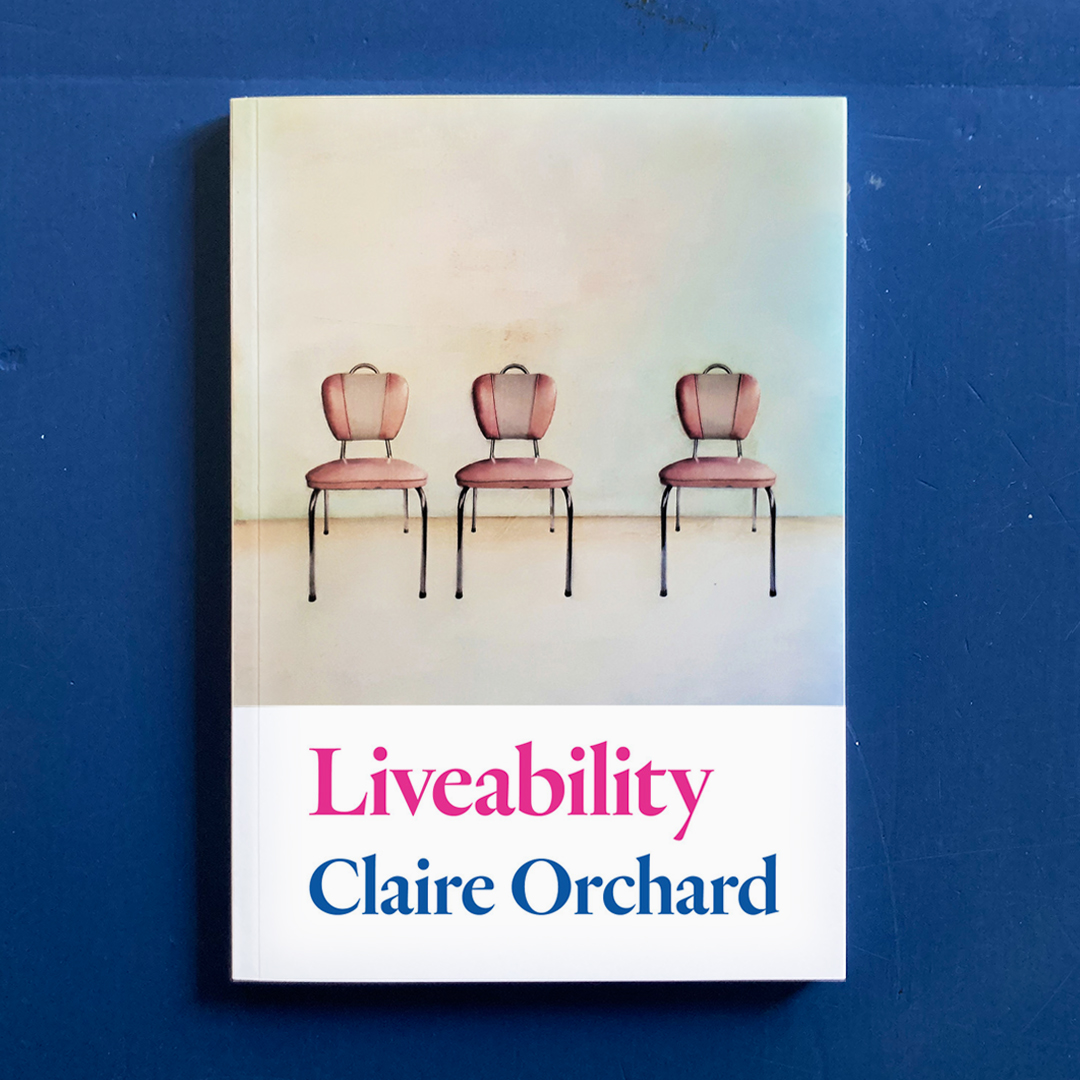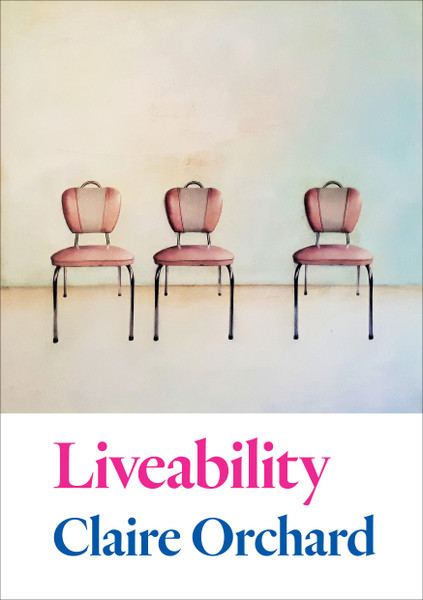The chair makes the room: Launching LIVEABILITY by Claire Orchard
Posted by Ashleigh Young on 21st Jul 2023
On Thursday 20 July we launched Claire Orchard's new book of poems, Liveability. It's a good one!
Editor Ashleigh Young had a ramble about this book, below. Thank you very much to Good Books for hosting us.

We are here to launch an excellent,
funny and clever book of poems called Liveability.
In an interview with the Sunday
Star-Times last week, Claire was asked the question: ‘What makes the
characters in your poems interesting or extraordinary?’ This is sort of a
terrible question for a writer. It’s like being asked: 'So tell us, what’s so good about this
then?' Claire answered the question gracefully, noting:
‘One of the most
fascinating, and alarming, aspects of being human is our ability to tell
stories about our experiences.’
The word I like there is ‘alarming’. We hear a lot about how wonderful and important it is to tell stories, and how we can only make meaning for ourselves by telling stories. I feel that we don’t hear nearly enough about how alarming and disorienting it can sometimes be to hear a story or even tell one.
Because, in a number of Claire’s poems, I’m alarmed not only by the story being told, but the fact it is being told at
all. I wonder, what was going on before this story came about? What could
have led to this revelation? And what will happen next?
Case in point: one
poem called ‘Staining baby’, in which two people are applying stain to a literal baby, using a
big brush and a wire bucket.
Stopping for a moment to contemplate
the section we’ve finished, I see
the effect is just as we’d planned
and I’m feeling hopeful we’ll finish the job
although undoubtedly it’s proven
a bigger affair than either of us
anticipated …
Even more than the excellent scene being described here, I love
the workmanlike storytelling of this poem, and I love to imagine the story
outside the poem – presumably there’s a building, maybe a whole development,
made of these babies.
In another poem, the narrator is just going along, thinking
about dead friends, when suddenly she reports:
Just now I was driving with
Geoff, he was
sitting right next to me in the passenger seat,
when a bullet
pierced the windshield.
Whereupon the poem ends, presumably because the narrator is blinded by glass fragments, but I like imagining that the narrator has collected themselves just enough to quickly tell the story while Geoff is dying beside them.
Claire also has a way of dangling a story in front of us then yanking us back into the present moment of the telling – like in ‘Helicoptering’, when someone hears a helicopter overheard and thinks about weighty things like mountaineering disasters and a distant uncle who fought in Vietnam, but then she realises that the helicopter is actually just her next-door neighbour Judi’s little electric lawnmower. That whiplash effect feels so honest, in a way: how the grandeur and tragedy and deeper meaning that we sometimes reach for in our lives is so often interrupted by everyday silliness or the usual petering out of things. Another way of putting it, like in Claire’s poem ‘Landscape’: ‘I’ve always hankered after / hydrangeas like my nana’s, but they never grow well / for me, no matter what kind of shit I dig into the soil.’
Many of Claire's poems are ruthlessly unsentimental about family and childhood. A poem about an 18-year-old son who crashes the car into a bus – he could've been killed! – ends with all the passengers just getting off and walking away in different directions. Or the poem ‘Pizza’, directed to a boy who can’t decide what to order, which ends with this sort of outburst: ‘How about I tell you what you need to know / and you make an informed decision.’ I also love a poem about an argument with one’s mum about advance care planning. The mum keeps changing her mind about whether or not she wants to be cremated.
I say, Mum, once you’re gone you
won’t care
and we’ll just do whatever we
want.
This is so right and honest about
how, with family, we can be pushed by our love and exasperation to an almost bloodthirsty practicality. We must sort this nonsense out and continue. And in
the end we will get off the bus and walk away in different directions.
Or, like this moment in ‘Stronger this year’:
We persist
in singing the team songs our
fathers taught us.
Yes! Keep going my son! we
bellow, numb-punching
each other’s arms. Don’t dare
stop, you hear?
At the same time as showing us the workings of these relationships, the poems also have a tenderness. It's a secret, hidden tenderness. It is often expressed through an acknowledgement, maybe even a wonder, at how different our worlds can be from those of the people closest to us. In Claire’s poem ‘Xanadu summer album’, the narrator’s brother doesn’t remember his sister getting whacked in the head with a plank of wood but he does remember how, at sunset, the roof of a longdrop would turn silver. As Claire says in another poem, 'If only getting to know these things felt like enough.’
Claire does this enviable thing of keeping a very light grasp on imagery, on story, on voice – instead of squeezing them to death, which is the great temptation for poets. And that light touch allows her to travel through a great variety of subjects beyond family – the life and times of a medical manikin, a cloud physicist’s childhood in Vermont, the lives of two geckos called Romeo and Juliet, and what Leonard Nimoy might think when he sees you sitting on the couch in front of the TV. The experience of reading a Claire Orchard poem is often like, ‘Look at that. LOOK at it.’ The impression I’m left with is a writer showing me how to see. Showing us how much more there is to see in the temporal, how much more there is to find weird and funny and a bit sad but then funny again.
One last thing to briefly mention: the chairs on the cover. We looked at a lot of chairs when we were figuring out what to put on the cover. At one point, we were very close to having a photo of some lonely-looking black-and-white chairs by a Czech photographer. I’m glad we came back to these more sociable-looking chairs by Deb Fuller, a Banks Peninsula artist. But what’s the significance of chairs? At first I was flummoxed. The interviewer should’ve asked, what’s so interesting and extraordinary about chairs, Claire? I think the answer is probably somewhere in the poem ‘The Thing Is':
Armchairs
are only called Armchairs because
of their Arms. Chairs without
Arms are just Chairs. We never
think of it. This is often
where the Trouble starts, from
not recalling Details such as
This.
I love that bit: ‘this is often
where the trouble starts’. All of this trouble could've been saved, if only we had thought more about chairs. But figuratively, it’s actually sort of true. It’s very easy to never
give a thought to how we actually, materially, honestly live our lives – which,
a lot of it, for me anyway, involves sitting. Like Mr Burns, I love a good sit. Whenever I’m standing up and
walking around I’m literally just on my way towards another chair. Like Annie
Dillard says, ‘How we spend our days is, of course, how we spend our
lives.’ Claire sees this truth so clearly and makes such delightful work
out of it. And as she notes in another poem, a chair can truly make a room.
~~~
Liveability (paperback, $25) is available at Good Books, all other good bookshops, and here on our website.

